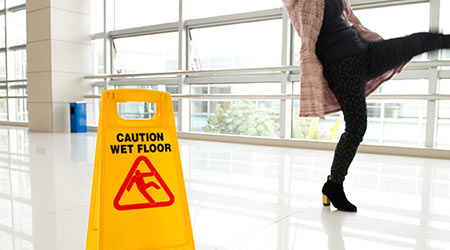« Back to Facilities Management Flooring Category Home
Slip-Resistant Flooring in an Unsteady World
March 16, 2018
- Flooring
By Mitchell Bryant
No matter what an institutional or commercial facility specializes in, it is crucial that the environment is equipped with a flooring solution geared toward safety. After all, guests, patients, students and staff deserve the peace of mind in knowing that their well-being is taken seriously.
While no flooring option can 100 percent ensure that slips and falls will never occur, choosing a non-slip flooring solution will go a long way in minimizing that risk. Managers can achieve this goal by examining the reasons to choose non-slip flooring and understanding the most appropriate slip-resistant flooring options for top market segments.
Why Choose Non-Slip Flooring
The scenario is common: A person is simply walking along the hallways at work or even the local supermarket, when all of sudden he or she loses their footing and begins the fight to stay upright. This is an embarrassing and frightening experience, but it is also is quite unnerving from a statistical perspective.
Nearly 4,700 fatal work injuries were reported In the United States in 2014, according to the Census of Fatal Occupational Injuries conducted by the U.S. Bureau of Labor Statistics. Slips, trips, and falls accounted for 793 of those fatalities. With numbers like these, it is easy to see that choosing non-slip flooring is paramount to helping eradicate these staggering numbers.
Flooring considerations by market
Health care. Due to polished tiles and liquid spills, health care flooring can often become slippery. While these environments can be hectic and extremely busy, choosing a flooring solution that is slip-resistant, extremely durable, and easy to maintain is critical to facility success.
Rubber and luxury vinyl tile (LVT) are two popular options that are capable of meeting these performance requirements. Rubber is designed with a focus on traction while also being soft underfoot and sound absorbent. LVT, on the other hand, is tough, easy to clean, and resistant to skidding, making it a great option for installations that require a hard surface material.
Education and corporate. When it comes to education and corporate facilities, implementing a flooring that is geared toward safety and quiet is of most importance. In these environments, students and employees alike must be protected from falls and noisy disruptions of concentration.
Therefore, using a flooring material such as carpet or carpet tiles can help meet these needs. Carpet is naturally slip-resistant yet soft enough to cushion falls when they occur. Carpet is also naturally sound-absorbing and can block out unwanted noises, such as heavy foot traffic.
Industrial and retail. For these environments, flooring not only must be slip-resistant, but it must also be durable enough to resist heavy forklift traffic, tire marks, abrasions, oil, fuel, chemicals, road salt and other contaminants. Therefore, it is wise to choose a flooring solution, such as epoxy resin, that is designed to last under these strenuous demands.
Epoxy resin uses floor coatings to create long-lasting, aesthetically pleasing, cost-effective concrete surfaces. Epoxy resin also enhances facilities, accommodating versatile design customizations, such as corporate logos for branding and aisles for wayfinding and traffic flow. Epoxy resin also offers a range of other benefits, including easy maintenance, thermal shock resistance, and rapid implementation for minimal downtime.
Mitchell Bryant is communications specialist with Spectra Contract Flooring, a U.S. commercial flooring contractor.








